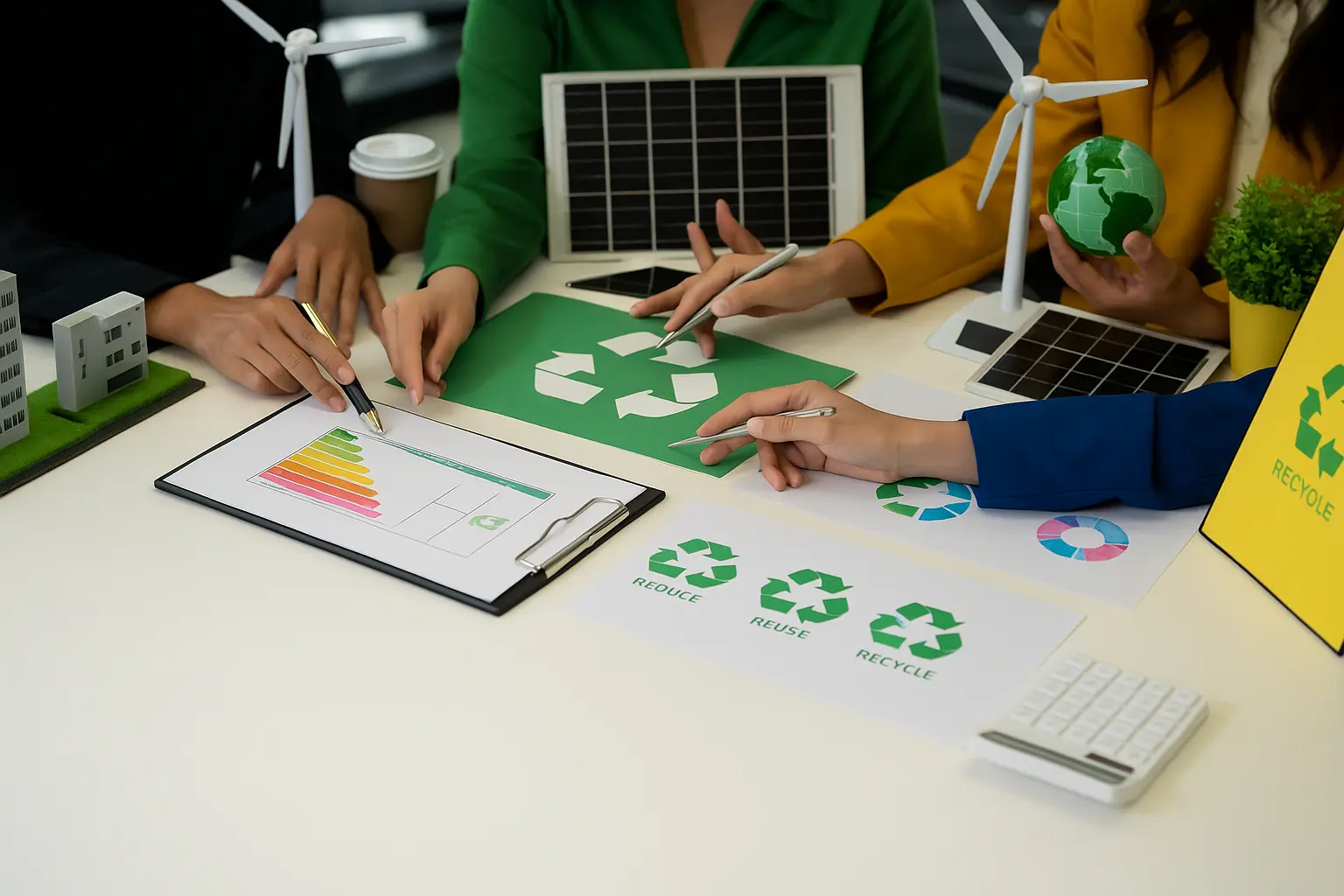No Future Without Integrity
As of 2025, sustainability is no longer a “goodwill policy” but a financial, legal, and social necessity. Yet, one principle that should lie at the heart of this transformation is still insufficiently discussed: ethics.
Without ethics, sustainability strategies remain nothing more than well-written reports, greenwashed campaigns, or compliance checklists. Real progress begins when companies choose to do the right thing not because it is legal, but because it is fair.
Today, sustainability means far more than reducing carbon emissions, cleaning supply chains, or transitioning to a circular economy. It now requires a holistic ethical understanding that respects human rights, protects nature as a shared resource, and ensures fairness for future generations.
Therefore, ethics in sustainability is not a “complementary element” anymore — it is a governance principle, a resilience strategy, and a guarantee of credibility.
The Ethical Framework: From Principles to Policies
Ethics is not an abstract set of “values” within sustainability strategies, but a concrete decision-making system. As of 2025, companies are evaluated not only by what they do but how they do it. This transformation unfolds along three main ethical dimensions: rights-based approaches, the principle of non-maleficence, and a culture of justice and accountability.
- Rights-Based Approach
Whatever its field of activity, a company’s primary duty is to protect human rights. Every process — from supply chains to working conditions, from digital technologies to data privacy — must place human dignity at the center.
According to the World Benchmarking Alliance 2025 Report, 80% of high-performing ethical sustainability companies have integrated human rights risk assessments into corporate decision-making. This confirms that sustainability is not only an environmental duty but a human one.
- Principle of Non-Maleficence
Ethical sustainability involves not only “doing good” but also “doing no harm.” This is critical for addressing environmental impacts, biodiversity loss, and the social consequences of corporate actions.
At the OECD Responsible Business Conduct Forum 2025, one key debate centered on “accounting for invisible harms” — making the entire chain of production and finance transparent. An ethical organization must measure not only its carbon footprint but also its social and ecological footprint.
- Justice and Accountability Culture
Ethics lives not in policy documents but within organizational culture. Ethical sustainability must therefore be supported by fairness, transparency, and accountability in all decision-making processes.
According to Harvard Business Review (2025), Ethical Leadership in Sustainability Transitions, companies with ethical leadership cultures show 30% higher performance in investor confidence and employee engagement — proving that ethics is not just a value, but a form of strategic capital.
Ethical Violations and the Greenwashing Trap
Ethical sustainability is a test of consistency and truth. Companies failing this test face major reputational and compliance risks, as investors, regulators, and consumers increasingly look beyond “green claims” to the evidence behind them.
- The New Face of Greenwashing
Greenwashing — or “green cosmetics” — has become one of the biggest ethical crises of the late 2020s.
The EU Green Claims Directive (2025) now classifies unverified environmental statements as “consumer deception.” No brand can claim to be “carbon neutral” without verifiable proof.
True ethics means transparent communication backed by evidence, not marketing slogans. Companies must build trust through transparent reporting systems, verifiable metrics, and independent audits.
- Fragility of Reputation and Ethical Erosion
Ethical violations are not only legal risks but strategic breaking points.
According to the Edelman Trust Barometer 2025, 71% of consumers say they would permanently abandon a brand after a single ethical scandal. This demonstrates that reputation can no longer be protected through crisis management alone — ethical consistency is now the foundation of corporate resilience.
- Financial Ethics and Sustainable Investment
Ethical sustainability now also determines the direction of capital. With deepening ESG criteria, companies engaging in unethical practices are categorized as “high-risk investments.”
Morningstar ESG Risk Atlas 2025 reveals that companies failing ethical standards experience up to 40% lower rates of long-term investment attraction — proving that ethical failure carries both moral and financial costs.
Leadership and Accountability in Ethical Sustainability
Ethical sustainability is defined not by policies but by leadership. A company’s values, its decision-making process, and its stance in times of crisis transform ethics from an abstract idea into an organizational reflex.
- Redefining Ethical Leadership
In 2025, ethical leadership is no longer about protecting reputation but leading fair transformation. Ethical leaders balance sustainability goals with economic growth while assessing the social impacts of their decisions.
According to Harvard Business Review (2025), companies led by ethically driven executives perform 68% better than competitors in both employee commitment and investor trust.
- Accountability: The Core of Ethical Management
In ethical sustainability, accountability means building a genuine culture of oversight — not just submitting reports. Real accountability is achieved through transparent data, independent audits, and publicly shared outcomes.
The Corporate Sustainability Reporting Directive (CSRD), effective from 2025, requires companies to present sustainability data with the same rigor as financial statements — turning ethical management from a PR tool into a strategic necessity.
- Institutionalizing Ethical Culture
Ethical behavior is the shared responsibility of all employees. Companies must therefore reinforce this culture through ethics training, risk assessments, and open feedback channels.
The true measure of an ethical organization is not how it behaves in times of crisis — but how it behaves when no one is watching.
The Future of Ethical Sustainability: From Transformation to Balance
Ethical sustainability is becoming a precondition for existence in the business world of the future. Global value chains, climate-related financial risks, and rising inequality have made companies accountable not only for financial performance but also for ethical integrity.
Today, ethics is as measurable as carbon emissions, labor rights, or data security. Yet, beyond numbers lies intent — why we act, which values guide us, and with whom we share this journey.
True sustainability balances:
– environmental goals with economic growth,
– social justice with competitiveness,
– profitability with responsibility.
Ethics lies at the heart of this balance — the conscience of the system — making companies not only sustainable but also just and trustworthy.
By 2025 and beyond, ethics will no longer stand at the margins of corporate strategy — it will define its very core.
Success will no longer be measured by how much we grow, but by how we grow.
Discover ADRİstanbul’s Services in Ethical Governance
ADRİstanbul provides institutions with governance and accountability-oriented support at the intersection of ethics and sustainability.
To prevent ethical risks, establish transparency, and build long-term trust, ADRİstanbul offers expertise in:
- Developing corporate ethics audits and codes of conduct
- Establishing ethical compliance mechanisms within ESG processes
- Resolving disputes peacefully in line with ethical principles
- Designing leadership and training programs on integrity and responsible decision-making
- Building ethical resilience into organizational culture through strategic frameworks
This Article Contributes to the Following Sustainable Development Goals (SDGs):




Frequently Asked Questions
What is ethical sustainability?
It is the practice of integrating environmental, social, and economic objectives within a framework of ethics, integrity, and accountability.
Why is ethics central to sustainability?
Because sustainability is not only environmental but also moral. Without ethics, sustainability risks becoming hollow — or worse, greenwashing.
How do ethical violations affect ESG performance?
They damage trust, investor confidence, and a company’s capacity for long-term value creation.
Why is ethical leadership important?
Because ethical leaders not only make decisions — they set examples, foster trust, and ensure fairness. This is the foundation of a sustainable corporate culture.
How does ADRİstanbul support this area?
By developing ethical governance models, mediation-based resolution frameworks, and capacity-building programs that strengthen institutional ethical resilience.




